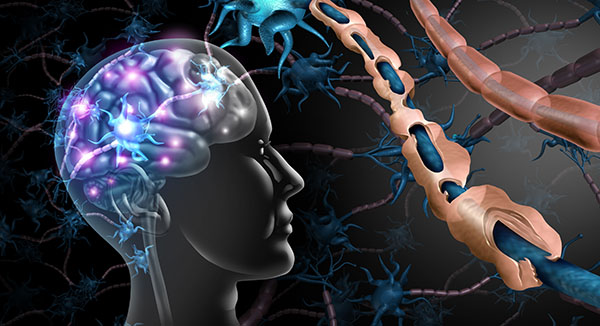 Parler
Parler Gab
Gab
- A study reveals that individuals with the HLA-E*01:01 gene variant face a significantly higher risk of developing multiple sclerosis (MS) only if they’ve had infectious mononucleosis caused by Epstein-Barr virus (EBV). This explains why only a small fraction of EBV-infected people develop MS.
- For those with two copies of the HLA-E*01:01 variant, the combination of the gene and prior EBV infection accounted for 65% of their MS susceptibility, independent of other risk factors like smoking or obesity.
- EBV may exploit the HLA-E gene’s role in immune regulation, allowing the virus to persist and trigger autoimmunity. A 2023 Harvard study also found EBV infection increases MS risk 32-fold, calling it a "necessary" factor.
- While EBV infects 90–95% of adults globally, MS is rare (0.1–0.5%). Past studies show EBV antibodies often precede MS by years, and MS cases only occur post-EBV infection, solidifying causality.
- The findings could lead to early risk screening (testing for HLA-E*01:01 and EBV), EBV vaccines (e.g., Moderna’s candidate) and targeted therapies to block viral triggers, potentially preventing MS.
How a common virus and a gene collide
HLA-E, a gene that helps regulate immune responses, has long been linked to autoimmune conditions. EBV, which typically causes asymptomatic infections in childhood, gains attention when it triggers mononucleosis—a condition marked by fever, fatigue and swollen lymph nodes. The 2023 Cell study highlighted that EBV can boost production of a protein encoded by HLA-E, aiding infected cells in evading immune detection. This mechanism may allow EBV to persist and inadvertently provoke the body’s immune system to attack itself. “We’ve long known that EBV and MS are connected, but why most people never get MS after EBV infection remained a mystery,” said Dr. Lisa Kiani, a senior editor at Nature Reviews Neurology. “This study suggests the genetic gatekeeper lies in the HLA-E variant.” Nova’s research supports this, showing the HLA-E*01:01 variant may render the immune system less effective at controlling EBV, potentially allowing the virus to trigger MS. The findings add to a growing consensus. A groundbreaking 2023 study led by Harvard’s Dr. Alberto Ascherio linked EBV infection to a 32-fold increase in MS risk, deeming it a “necessary” factor. “Most MS cases could be prevented by blocking EBV, and this gene discovery tightens that link,” said Ascherio. Yet exactly how EBV and genetics conspire to derail the central nervous system is still evolving.A decades-long culprit: EBV’s journey to center stage
The EBV-MS connection isn’t new. For years, researchers observed an epidemiological association but lacked proof of causality. EBV infects 90-95% of adults globally, yet MS affects just 0.1–0.5% of the population. Studies found that EBV antibodies often predated MS diagnoses by years, exceeding chances of coincidence. In January 2023, Ascherio’s team analyzed over 10 million U.S. military members, finding MS developed exclusively in individuals after EBV infection. Cortese noted in a separate presentation at ACTRIMS 2023, “The evidence now suggests EBV is the leading cause of MS.” But isolating genetic predispositions like HLA-E01 helps explain why some people remain unaffected. For individuals like Christian Denis, a 39-year-old MS patient, these revelations mesh with personal experience. His 1999 “kissing disease” episode — undiagnosed at the time — prevented him from playing sports until symptoms resurged three years later as MS. “I never connected the dots. Now I see how my mono and genetics might’ve conspired against me,” Denis said.Toward prevention, precision medicine and vaccines
The study’s implications could redefine MS care. Testing for HLA-E*01:01 and prior EBV infections may soon pinpoint high-risk individuals early, enabling proactive treatments to delay or mitigate MS onset. “Early intervention arrests progressive damage,” said Nova. Vaccine development also gains momentum. EBV vaccines, like Moderna’s experimental candidate, could spare future generations. “Preventing EBV means preventing MS,” said Dr. Lawrence Steinman of Stanford. Similarly, antivirals targeting EBV during mononucleosis might reduce MS risk, mirroring approaches for other herpes viruses. Personalized therapies might also emerge for those already at risk. “Imagine a blood test identifying your MS odds after mono,” said Steinman, citing dual roles of antibodies and genes. For diagnosed patients like Denis, such tools could spur optimism: “Knowing this might help others avoid my rollercoaster.”A new era in MS research
This study marks a turning point, transforming MS from an inscrutable disorder to a condition with identifiable triggers and pathways. By unravelling the EBV-HLA-E interplay, researchers pave the way for predictive medicine, vaccines and possibly even cures. As Dr. Ascherio noted, “This isn’t just about MS — it’s a blueprint for uncovering virus-triggered autoimmune diseases.” The genetic revelation, paired with advances in gene editing and viral prevention, offers tantalizing hope. While MS remains incurable today, the dawning understanding of its origins ignites the vision of a future where this debilitating disease becomes history. Sources for this article include: LiveScience.com BusinessInsider.com Healio.comFDA forces Pfizer, Moderna to admit COVID vaccines cause lasting heart damage in young males
By Lance D Johnson // Share
New Hampshire makes history as first New England state to ban sanctuary cities
By Cassie B. // Share
Combining hope and science: The integrated approach to cancer care
By Belle Carter // Share
Comer investigates Biden health cover-up, seeks testimony from physician and top aides
By Cassie B. // Share
Governments continue to obscure COVID-19 vaccine data amid rising concerns over excess deaths
By patricklewis // Share
Tech giant Microsoft backs EXTINCTION with its support of carbon capture programs
By ramontomeydw // Share
Germany to resume arms exports to Israel despite repeated ceasefire violations
By isabelle // Share










